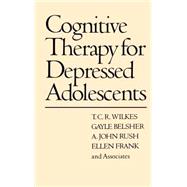Based upon and adapted from Aaron T. Beck's cognitive therapy for depressed adults, this long-awaited volume provides general strategies and specific tactics for the use of cognitive therapy with depressed adolescents. Featuring strategies derived from years of clinical work and repeated testing, Cognitive Therapy for Depressed Adolescents provides patient-therapist narratives that convey a clinical feel for how this therapy works, as well as actual case vignettes illustrating effective techniques for diagnosis and treatment. Throughout, the book stresses that the approach be both interactive and educational.
The manual opens with a theoretical overview of cognitive therapy applications. Chapters present ten key principles of cognitive therapy with adolescents and techniques for assessing and diagnosing depression. Part II focuses on special issues that arise in the treatment of adolescents--developmental considerations, ways to create and sustain a therapeutic relationship, and how to involve the entire family in the adolescent's treatment.
Part III describes the macrostages and microtechniques in cognitive therapy with chapters presenting an in-depth analysis of goal setting, intervention, and termination. Part IV discusses comorbidity and strategies for working with substance-abusing teenagers, survivors of sexual victimization, and suicidal adolescents. Although the emphasis of this manual is on outpatient treatment, brief periods of hospitalization are often part of the management of depressed adolescents, so one chapter in Part V is devoted to the use of cognitive techniques in the inpatient setting, and another describes general management issues and psychopharmacological treatment. Finally, the chapter considers therapeutic failures and obstacles one encounters when working with this population.
Providing guidelines and principles of cognitive therapy techniques for the treatment of depressed adolescents, this volume will be of value to psychotherapists, psychiatrists, psychologists, social workers, and counselors. These adapted techniques will also add to the repertoire of cognitive therapists who normally work with depressed adults but also encounter adolescents in their practice. Useful as a teaching text in courses that discuss new applications for cognitive therapy techniques, this book is also ideal supplemental reading in courses on psychology and psychotherapy.
The manual opens with a theoretical overview of cognitive therapy applications. Chapters present ten key principles of cognitive therapy with adolescents and techniques for assessing and diagnosing depression. Part II focuses on special issues that arise in the treatment of adolescents--developmental considerations, ways to create and sustain a therapeutic relationship, and how to involve the entire family in the adolescent's treatment.
Part III describes the macrostages and microtechniques in cognitive therapy with chapters presenting an in-depth analysis of goal setting, intervention, and termination. Part IV discusses comorbidity and strategies for working with substance-abusing teenagers, survivors of sexual victimization, and suicidal adolescents. Although the emphasis of this manual is on outpatient treatment, brief periods of hospitalization are often part of the management of depressed adolescents, so one chapter in Part V is devoted to the use of cognitive techniques in the inpatient setting, and another describes general management issues and psychopharmacological treatment. Finally, the chapter considers therapeutic failures and obstacles one encounters when working with this population.
Providing guidelines and principles of cognitive therapy techniques for the treatment of depressed adolescents, this volume will be of value to psychotherapists, psychiatrists, psychologists, social workers, and counselors. These adapted techniques will also add to the repertoire of cognitive therapists who normally work with depressed adults but also encounter adolescents in their practice. Useful as a teaching text in courses that discuss new applications for cognitive therapy techniques, this book is also ideal supplemental reading in courses on psychology and psychotherapy.








